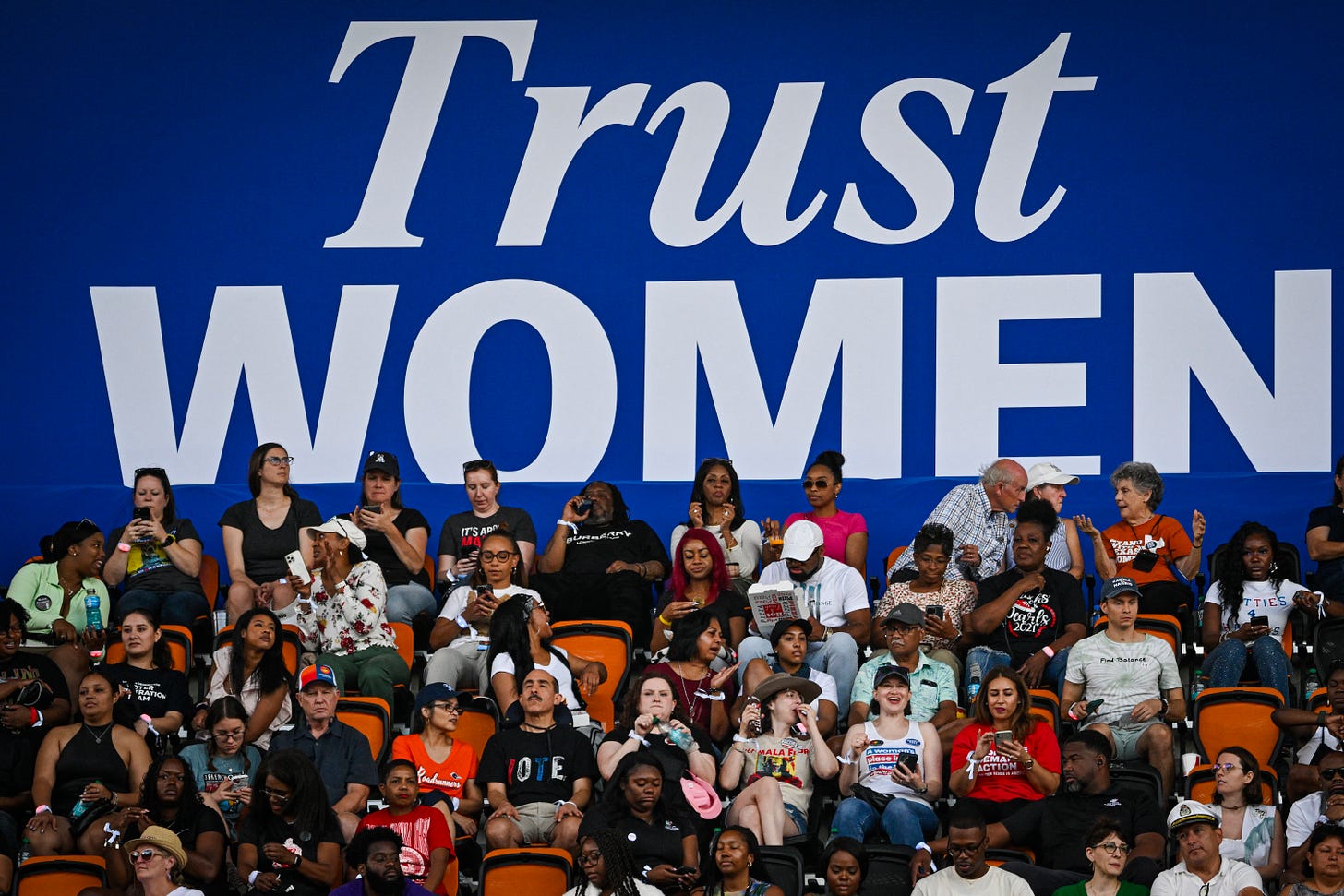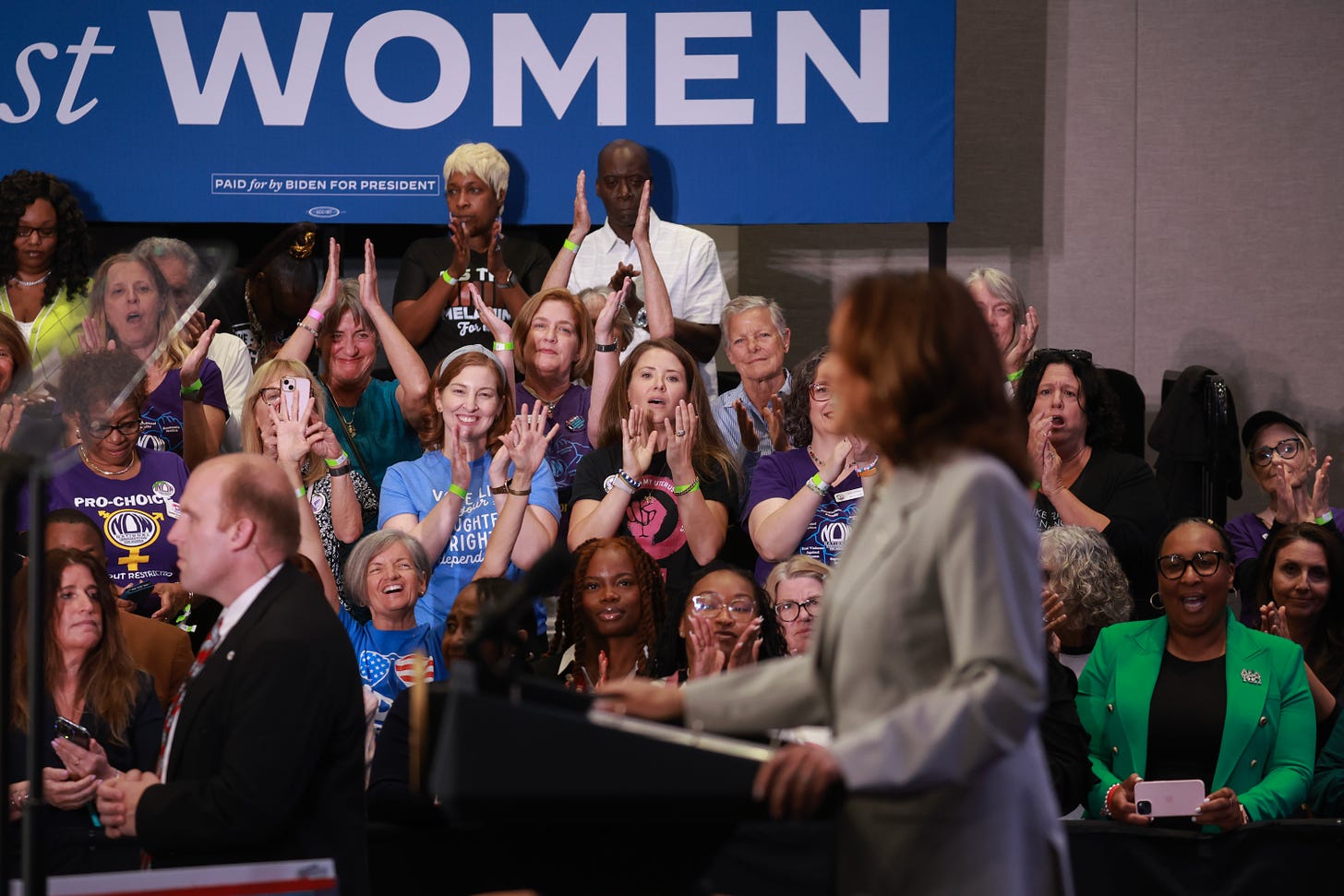

AT MY APARTMENT BUILDING in suburban Cleveland, I asked some of my neighbors what they thought of Donald Trump’s rally at Madison Square Garden last weekend. Most didn’t know anything at all about it, so I filled them in: One guy said Puerto Rico was an “island of garbage” while another said Kamala Harris’s campaign team were “pimp handlers.” Hillary Clinton was called a “sick bastard.” And former Fox News host Tucker Carlson said Harris is a bad candidate because she has a “low IQ.”
None of that stuff got any contemplative reaction from the men I talked to. They gave the usual “don’t care” or just another example of the “lying media.” Their ears perked up a bit when I noted that Hulk Hogan and Elon Musk were also there.
But an older woman I spoke with, a recently retired secretary at a Cleveland law firm in her mid-60s, had a different response. She said it all sounded like “men acting like idiots as Trump likes them to.” There are times, she added, “I think that the men who follow Trump act like boys who never grow up. I used to think we got wiser as we got older, but I’m seeing Trump’s older men followers are mostly regressing.”
“It’s obvious why he does poorly with women,” she continued. “Women don’t like it when men act like that.”
I told her that hardly any women spoke at the MSG rally, and that she surprisingly shared the same synopsis as conservative media personality Megyn Kelly, who said on her podcast this week that the rally was “too bro-tastic.” My neighbor rolled her eyes at the idea that she and Kelly are similar thinkers.
The reaction at my apartment building underscored both the bifurcated way in which this election is being processed and the risks that Trump is running. The media’s response to the rally (the New York Times referred to it as an event featuring “Misogynistic, Bigoted and Crude Rally Remarks”) told a similar story.
Trump’s Madison Square Garden rally was a dude-bro affair more intensive than most. It also came at a time when the campaign should be soliciting women’s votes, not insulting them.
IT’S REALLY QUITE SIMPLE. Women are more than half of the voting public in this country. Survey after survey says they don’t like Trump much. And the polling says they are backing Harris in higher numbers than they backed Joe Biden four years ago.
In an election that has been focused on Trump’s overtures to men and defined by polling that shows a tied race, women are poised to decide the outcome.
Women out-voted 53-47 percent in 2016 and 52-48 percent in 2020, which means that more than 6 million more women than men voted for president in the past two cycles.
And there are signs in the polling that Harris has more support among women than Trump has among men this cycle. A recent ABC News/Ipsos poll has Trump winning men by 51-45 percent, while Harris is at 56-42 percent with women (all likely voters).
A CNN poll released on Wednesday showed similar trends. It had Harris +8 with women and running even with men in Michigan. It had her running +19 with women with Trump +12 with men in Wisconsin. In Pennsylvania, it was slightly inverted, with Harris +3 with women and Trump +4 with men, while a Quinnipiac University poll of the commonwealth released the same day showed men backing Trump by 57-37 percent, while women backed Harris 55-39 percent.
But other polls from Pennsylvania have told a different story. A recent AARP poll had Harris up over Trump 50-47 percent in a head-to-head matchup in the state. She had a 19 point advantage over Trump among women, while Trump led by 16 points with men.
Ultimately, the conclusion is simple: If women are more likely to vote than men, and if women are more supportive of Harris than men are of Trump—especially in key swing states—then Harris should win.
The one area where she could be tripped up is if fewer women show up to the polls in swing states than men do.
But here, too, the data are in Harris’s favor. In 2020, 68 percent of eligible women voted, compared to 65 percent of men. According to records compiled by the U.S. Census Bureau, about 372,000 more women voted than men in Pennsylvania in 2020. And the reality is that those 372,000 more women led to Biden’s 80,000 vote victory in Pennsylvania in 2020, as the exit polls indicated he had an 11-point lead with women (while Trump had a equally large lead with men).

THE “GENDER GAP” MATH IS UNDER-APPRECIATED in coverage of the race. More women will likely show up to vote than they did in 2020, and they will be supporting Harris more than they did Biden four years ago. Trump may be making gains with men. But he’s going to have to turn out a lot more of them if he wants to keep up. That seems unlikely to happen, because women have a couple dogs in the hunt now that they didn’t have in 2020.
The first is the Supreme Court’s Dobbs decision ending a federal right to abortion in 2022, and the second one is that a woman is running for president. We can go around and around on how big an influence those two developments will have on voting patterns. But my experience over the last few years interviewing many women in the Midwest “Blue Wall” states is that abortion and her gender issues are strongly motivating women to vote for Harris and against Trump.
There is one other factor at play here, which the media is also missing. As I noted over the summer, women don’t think Trump respects them:
Or take this April New York Times/Siena College poll. Buried in the middle was an important question that went unreported: “How much do you think Donald Trump respects women?” Nearly a quarter of the women respondents (24 percent) said “not much”—and a staggering 44 percent said “not at all.” Taken together that is 68 percent of half the U.S. population indicating a presidential candidate doesn’t like them. This was not a survey group trending younger (about 57 percent of the women surveyed were over 45), nor very liberal (35 percent said they were “moderate,” 19 percent “somewhat conservative,” 13 percent “very conservative”). About 20 percent of the overall respondents were from the Midwest.
So when we take the facts that are in play here—1) women vote in much higher numbers than men, 2) in general, women’s support for Harris is higher than men’s support for Trump, 3) turnout will likely be higher among women this time around given the Dobbs abortion ruling and Harris’s candidacy, and 4) a general feeling among women that Trump doesn’t respect them—that should mean Harris has the gender voter differences going for her.
Georgia is a good example of how all this will play out next week. The latest polls show a dead heat in the state, and the difference between male support for Trump (+13) and women backing Harris (+12) is negligible. But 527,000 more women than men voted in Georgia in 2020, and Harris should expect a similar margin.
Biden was up by 9 percent over Trump with women in Georgia in 2020, while Trump was up by 12 percent with men. But women in Georgia had a 56-44 percent turnout advantage. The fact that Harris now has a higher level of support among women than Biden did in 2020, and Trump is about the same, suggests that the race isn’t as close as the polls say.
The trend in Georgia could be duplicated in all of the swing states. The story on Tuesday night may be that women were the dominant voting force.
Katherine Tate, a noted Brown University political scientist with expertise in gender and politics, put it this way a few days ago: “If Harris wins, it will be because women elected her. . . . The women’s vote will be decisive this election.”










